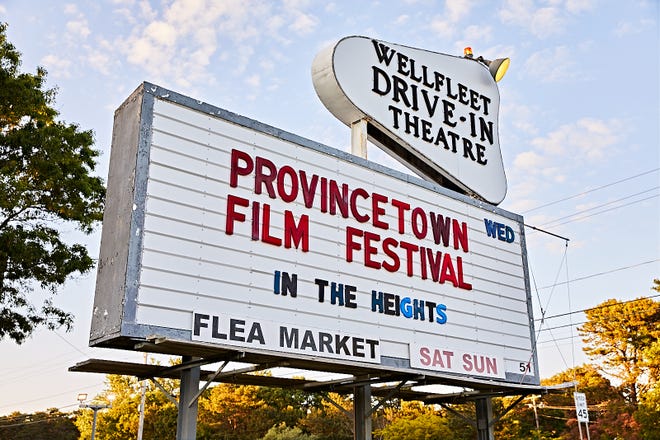PROVINCETOWN — As Pride month passes and companies across the country pack up their rainbow company logos, Provincetown will still be here. So will the queer stories.
The “hybrid” Provincetown Film Festival, which ran from June 16 to June 24, featured two series of queer shorts, 17 films in total, capturing diverse insights of those within the LGBTQ community. Several more feature length films like “Give or Take” and the closing night’s “Being Bebe” also centered on gay and trans characters.
There’s still time to see these, thankfully.
LGBTQ characters have seen more screen time nationally than in previous years, though coverage of the diversity of the queer community, especially queer people of color, still needs substantial work, according to GLAAD’s 2020 Studio Responsibility Index. The report highlighted a 23% decrease from LGBTQ characters of color in 2017, according to the 2020 report.
The Provincetown festival’s short film series challenge those trends in two to 22 minutes, featuring diverse stories of queer people of color, young and old.
“We have a competitive award for Best Queer Short and our audience being largely queer ensures that we program queer shorts,” said the film festival shorts programmer, Valérie Déus in a statement to the Banner.
The short film programs this year included Queer Shorts 1 (eight films totaling 94 minutes), Queer Shorts 2 (nine films totaling 80 minutes), New England Shorts 1 (five films totaling 79 minutes), and New England Shorts 2 (six films totaling 74 minutes).

Déus uses the same criteria every year to find shorts that push the conversation forward , she said. The queer shorts categories has been around for several festivals, she said.
Here’s a sampling of some of the titles included among the two queer-themed shorts that premiered online during the festival.
PURE, directed by Natalie Harris
Natalie Harris’ 12-minute “Pure” follows the journey of a young Black girl on the eve of her cotillion ball.
Changing from a white gown to a “Make America Gay Again” T-Shirt and glitter eyeshadow, Celeste (Mikayla Lashae Bartholomew) performs a poem at an open mic.
“From a young age, I was conditioned to be straight. Once a month the hairdresser washed and conditioned my hair to be straight, once a week the church conditioned my heart to be straight,” Celeste said.
The night ensues with a party, where Celeste wakes up in the morning with a stomach of guilt, questioning her purity. The coming-of-age short captures a defining moment for Celeste as she works to navigate religion, tradition, and beliefs that heterosexuality is the default sexual orientation.
The film’s uplifting end takes the viewer back to its opening credit, a quote from James Baldwin: “It took years of vomiting up all the filth I’d been taught about myself, and half-believed, before I was able to walk on earth as though I had a right to be here.”
Find out more at https://www.purethefilm.org/.
NOOR & LAYLA, directed by Fawzia Mirza
The relationship between two Muslim queer women, Noor (Nicole Nwokolo) and Layla (Sahar B. Agustin-Maleki), is told backwards – from the breaking up to meeting each other for the first time in this 13-minute film. Their story is marked, in parts, by five prayers of Islam: Fajr, Dhur, Asr, Maghrib, Isha.
The moments frame the women’s love for one another with their faith, tied by an alarm clock and a question: is it an end or a beginning?
“True love, no matter how many times you experience it, is about balance. Noor is Arabic for light and Layla is Arabic for night. Noor and Layla’s love is about balance,” said Mirza in a interview with “The Advocate.”
Find out more at https://www.fawziamirza.com/work-1
BREAK IN, directed by Alyssa Lerner
“This isn’t good-bye, this is Best-Buy,” according to this 16-minute comedic journey.
The story follows Best-Buy employee Noushua (Kimia Behpoornia) as she writes an erotic fiction story about her crush. What makes matters worse? She accidentally sends the story to her.
Noushua and her best-friend Oliver (Riley Westling) embark on a journey to delete the message before her crush can read it. The journey leads to, let’s say, some major road bumps. Though, the audience is left with a simple but very important reminder: you gotta change the names in *those* stories you write.
The story is a good reminder that not every queer story in media must be a dramatic or a sad one, rather instead it can follow a random and funny string of events.
Find out more at https://www.alyssalerner.me/break-in.
LEAP, directed by Juan Baio & Eino Antonio
A kiss, a glass spills, and a girl leaps up, with another film featured in the first queer shorts series.
“No me gusta las mujeres (I don’t like women)” she said, back turned on the rooftop of a massive building, surrounded by the Buenos Aires skyline.
In just three minutes, the Spanish film captures the moments a friendship is called in question, leaving two women at the brink of a resolution.
The film frames moments of anticipation met with a quiet liberation.
THE TAILOR, directed by Nathalie Therriault
Chosen families can be found at camp, in class or at the tailors.
A young non-conforming person finds comfort in a suit jacket and asks a nearby tailor to help with alterations.
The 16-minute portrait is featured in the first queer shorts series.
Though, after a phone call from their mother calling them a disgrace, they storm out of the store telling the tailor they’re not worth it.
A day later, upon return, the tailor gives back an altered suit jacket, telling his own story of wearing a dress and dancing with an army officer.
“It made me feel so beautiful,” he said. “I make pants for you. You will feel perfect too.”
The film’s characters demonstrates the tender courage of choosing to see and being seen just as you are.
COSMOPOLITAN, directed by Moran Nakar
Jacob goes out, for the first time in his life, to a gay party, but discovers that his skin color prevents him from being accepted into the community.
The 8-minute film is featured in the second queer shorts series.
Based on real experiences of Ethiopian LGBT activist Koby K. Tarakai, his story reveals the racism that continues to surface within the LGBTQ community, further isolating those within homophobic communities.
MI ARMA, directed by Jesús Pascual
In just a few minutes, a 21-year-old drag queen from Andalusia exposes the difficulties and the beauty of adding aspects of her homeland culture to her artistic expression.
The film is featured in the second queer shorts series.
The close-ups in soft color, and dramatic images paint a picture behind subversive traditions, and the prejudice and beauty that comes along with that.
A DAY WITHOUT YOU, directed by Oscar Arce Naranjo
On this day, Thomas must face the fact that he needs to move on from his relationship. But how?
The four-minute story, featured in the second queer shorts series, centers around Thomas retelling his partner about his long day: run, walk, work, market. At the start of the short, Thomas puts flowers in a vase.
At the end, though, Thomas brings those flowers to a gravesite of Carlos Diaz Rivera reads “beloved husband and friend.”
The film highlights the importance the beauty we often take for granted, in simple questions or moments from loved ones, such as, “how was your day?”
INFORMATION
To watch the short films, visit the Provincetown Film Festival website at https://www.provincetownfilm.org/festival/ or stay tuned for upcoming festivals.







